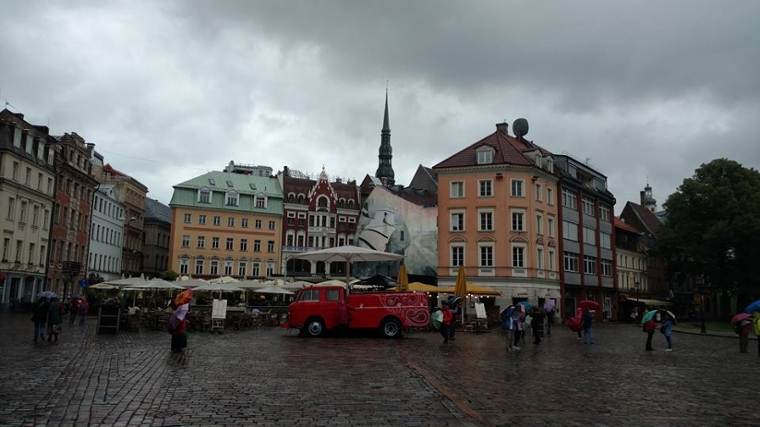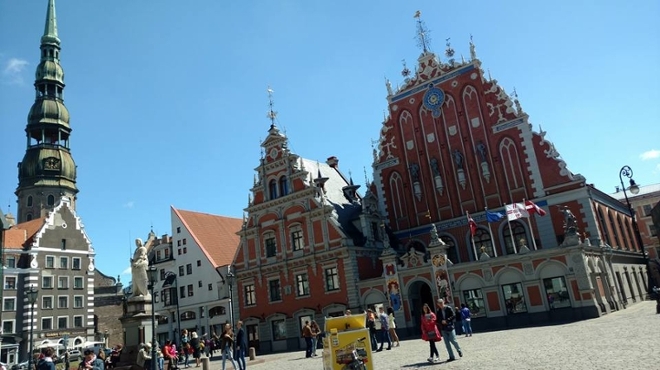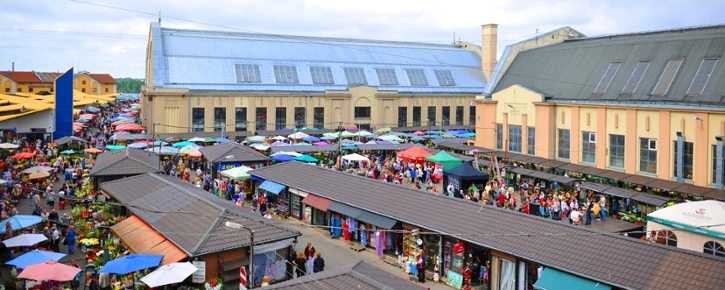Week 3: Latvia and Perceptions of America
Last weekend I visited Riga, Latvia, the largest city in the Baltic States. As with Vilnius, one of the real pleasures of exploring Riga is the architecture. Riga experienced a financial boom in the late Nineteenth and early Twentieth Century, resulting in the largest collection of art nouveau buildings of any city in the world. As such, there are many architectural joys to be found in Riga outside of the historic old town, as opposed to the many gray, Soviet-style apartment complexes that are so common in much of the rest of the former Soviet states. The old town is not as big as Vilnius’, but it actually feels bigger, as it is punctuated by a number of large public squares and some quite massive churches, including the Riga Cathedral, the largest church in the Baltics. The building that stood out the most to me, however, was the House of the Blackheads, a guildhall for unmarried German merchants originally built in the Fourteenth Century before being destroyed in World War II and rebuilt in the 1990s.


Unbeknownst to me when I booked the room, my hotel was actually right in the middle of the central market. Riga’s central market is the largest such market in all of Europe, and I found myself completely awed by its scope. The market is housed inside of five old German zeppelin hangars (only nine zeppelin hangars still exist in the world), but there’s just as much being sold outside with more than 3,000 trade stands set up. After walking around an entire hangar filled with nothing but meat, I had a hard time believing that Riga needed any other markets. A trip to the zoo and a jaunt around Riga’s beautiful Mezaparks (forest park) and my weekend trip to Latvia was complete.

I have been thinking recently about how the United States is perceived in Lithuania. The United States seems to have an aura of power and respect here, but not one that comes free of criticism. Working with an NGO, it is important to find partners to collaborate with, and I was told that my being American is helpful to convincing organizations to work with us. One of my colleagues was baffled by “Make America Great Again!” because he did not understand why some Americans feel that the U.S. is not great already. Many have questioned why an American would want to come to Lithuania, because it is supposed to be the other way around. At the Baltic Criminological Seminar in Estonia (more on that in my next post), criminologists from eight different countries presented their research, but the keynote speaker was a professor at the University of Nebraska. My colleague from VIL IAS took notes on his presentation, and nobody else’s, even though his topic was the death penalty in America, a topic with frankly little relevance in this part of the world.
But this respect does not come without some harsh critiques. Many have expressed to me that they find it difficult to understand America’s two-party political process that so often produces two candidates unpalatable to a large portion of the populace. America has been called out for its problems with gun violence and police brutality. I have been doing my best to paint a clear and thorough picture, but I have been asked many tough questions by people halfway across the world who are very interested in what the United States is up to. It is an odd feeling, to be in a position to speak on behalf of your entire country, a country with such a diverse array of opinions. But their questions also allow me to consider American issues from a different perspective, which has been a valuable learning experience.